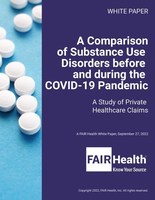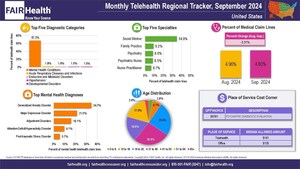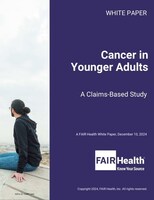From 2016 to 2021, over 60 Percent of Patients with Substance Use Disorder Diagnoses Were Male
Conversely, in the Same Period, over 60 Percent of Overdose Patients Were Female
From 2019 to 2021, the Proportion of Patients with Opioid and Opioid-Like Drug Overdoses Increased in 42 States, according to New FAIR Health Study
NEW YORK, Sept. 27, 2022 /PRNewswire/ -- In every year of the period 2016-2021, males accounted for 62 to 63 percent of the gender distribution of patients with a substance use disorder diagnosis, while females made up 37 to 38 percent, according to a new white paper from FAIR Health. In every year of the same period, females accounted for 60 to 61 percent of the gender distribution of patients with an overdose diagnosis, while males made up 39 to 40 percent. The white paper, released today, is entitled A Comparison of Substance Use Disorders before and during the COVID-19 Pandemic: A Study of Private Healthcare Claims.
In this report, drawing on the nation's largest repository of private healthcare claims, FAIR Health analyzes substance use disorders and overdoses prior to the COVID-19 pandemic as compared to during the pandemic. Trends in the percentage of patients with a substance use disorder or overdose diagnosis are analyzed, as well as such aspects as age, gender, incidence, relevant substances, states, preexisting mental health conditions, venues of care and provider specialties. Among the key findings:
- From 2019 to 2021, 42 states saw an increase in the proportion of patients with opioid and opioid-like drug overdoses compared to the total number of patients using medical services by state. The increases ranged from 148.4 percent in Pennsylvania to 0.7 percent in Minnesota.
- During the pandemic, the percentage of patients with a substance use disorder diagnosis decreased by 4.4 percent, from 3.5 percent of all patients in 2019 (pre-pandemic) to 3.4 percent in 2021 (during the pandemic). But in one age group, those 65 and older, the percentage of patients with a substance use disorder diagnosis increased 5.3 percent, from 3.3 percent of all patients in that age group in 2019 to 3.5 percent in 2021.
- The percentage of patients with an overdose diagnosis increased 4.3 percent, from 0.56 percent of all patients in 2019 to 0.59 percent in 2021.
- Alcohol and opioids were the top two substances associated with substance use disorders throughout the 2019-2021 time frame. Substance use disorders involving alcohol, however, increased over that period from 47 percent to 52 percent of the distribution, while opioids fell from 25 percent of the distribution to 21 percent.
- From 2016 to 2021, the share of patients with substance use disorders involving the use of stimulants (e.g., amphetamines, methamphetamines) rose 36.4 percent, from 0.046 percent of all patients to 0.063 percent; this percentage increase exceeded those of alcohol, opioids and cannabis.
- In 2021, the percentage of patients with an initial diagnosis of substance use disorder or overdose increased month over month compared to the two prior years.
- In 2019 and 2021, New Mexico was the state with the highest proportion of patients with a substance use disorder or overdose diagnosis.
- From 2019 to 2021, Nebraska was the state with the greatest increase in the proportion of patients with a substance use disorder diagnosis. Maryland was the state with the greatest increase in the proportion of patients with an overdose diagnosis.
- Sixty-five percent of patients who had a substance use disorder or overdose diagnosis in 2021 had a preexisting mental health condition. Generalized anxiety disorder and major depressive disorder, in that order, were the two most common mental health diagnoses in this population in 2021.
- The percentage of substance use disorder services rendered via telehealth rose from 0.3 percent in 2019 to 11.3 percent in 2020, then dropped to 9.3 percent in 2021.
- Psychiatrists' share of substance use disorder claim lines increased 112.4 percent, from 3.9 percent in 2016 to 8.3 percent in 2021.
FAIR Health President Robin Gelburd stated: "During the COVID-19 pandemic, substance use disorders and overdoses proved to be a significant public health issue. We hope our study of this issue offers helpful insights for patients, providers, payors, policy makers and researchers."
This study is the latest in a series of FAIR Health studies on the COVID-19 pandemic. Others have examined projected US costs for COVID-19 patients requiring inpatient stays, the impact of the pandemic on hospitals and health systems, the impact on healthcare professionals, key characteristics of COVID-19 patients, the impact on the dental industry, risk factors for COVID-19 mortality, the impact on pediatric mental health, treatment and hospitalization costs, the evolution of telehealth during the pandemic, and post-COVID conditions before and after introduction of an ICD-10 code for such conditions.
The new study also builds upon a series of white papers released by FAIR Health involving substance use disorders, specifically opioid abuse and dependence. Previous entries in that series include:
- The Opioid Crisis among the Privately Insured;
- The Impact of the Opioid Crisis on the Healthcare System;
- Peeling Back the Curtain on Regional Variation in the Opioid Crisis; and
- Opioid Abuse and Dependence.
For the new white paper, click here.
Follow us on Twitter @FAIRHealth
About FAIR Health
FAIR Health is a national, independent nonprofit organization that qualifies as a public charity under section 501(c)(3) of the federal tax code. It is dedicated to bringing transparency to healthcare costs and health insurance information through data products, consumer resources and health systems research support. FAIR Health possesses the nation's largest collection of private healthcare claims data, which includes over 38 billion claim records and is growing at a rate of over 2 billion claim records a year. FAIR Health licenses its privately billed data and data products—including benchmark modules, data visualizations, custom analytics and market indices—to commercial insurers and self-insurers, employers, providers, hospitals and healthcare systems, government agencies, researchers and others. Certified by the Centers for Medicare & Medicaid Services (CMS) as a national Qualified Entity, FAIR Health also receives data representing the experience of all individuals enrolled in traditional Medicare Parts A, B and D; FAIR Health includes among the private claims data in its database, data on Medicare Advantage enrollees. FAIR Health can produce insightful analytic reports and data products based on combined Medicare and commercial claims data for government, providers, payors and other authorized users. FAIR Health's systems for processing and storing protected health information have earned HITRUST CSF certification and achieved AICPA SOC 2 compliance by meeting the rigorous data security requirements of these standards. As a testament to the reliability and objectivity of FAIR Health data, the data have been incorporated in statutes and regulations around the country and designated as the official, neutral data source for a variety of state health programs, including workers' compensation and personal injury protection (PIP) programs. FAIR Health data serve as an official reference point in support of certain state balance billing laws that protect consumers against bills for surprise out-of-network and emergency services. FAIR Health also uses its database to power a free consumer website available in English and Spanish, which enables consumers to estimate and plan for their healthcare expenditures and offers a rich educational platform on health insurance. An English/Spanish mobile app offers the same educational platform in a concise format and links to the cost estimation tools. The website has been honored by the White House Summit on Smart Disclosure, the Agency for Healthcare Research and Quality (AHRQ), URAC, the eHealthcare Leadership Awards, appPicker, Employee Benefit News and Kiplinger's Personal Finance. FAIR Health also is named a top resource for patients in Dr. Marty Makary's book The Price We Pay: What Broke American Health Care—and How to Fix It and Dr. Elisabeth Rosenthal's book An American Sickness: How Healthcare Became Big Business and How You Can Take It Back. For more information on FAIR Health, visit fairhealth.org.
Contact:
Rachel Kent
Senior Director of Marketing
FAIR Health
646-396-0795
[email protected]
SOURCE FAIR Health

WANT YOUR COMPANY'S NEWS FEATURED ON PRNEWSWIRE.COM?
Newsrooms &
Influencers
Digital Media
Outlets
Journalists
Opted In







Share this article